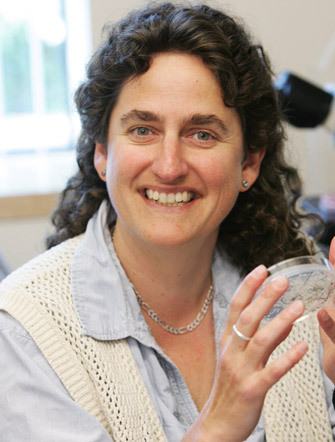
Certain mutated cells keep trying to replicate their DNA — with disastrous results — even after medications rob them of the raw materials to do so, according to new research from USC.
New imaging techniques allowed scientists to see for the first time that while chemotherapy drugs shut down the DNA replication process of most cancer cells, so-called “checkpoint mutants” just keep chugging along, unwinding the DNA and creating damaged DNA strands that can result in the kind of abnormalities seen in cancer cells.
“Older methods suggested that these checkpoint mutants stopped replicating and that the replication machinery simply fell apart to cause DNA damage,” said Susan Forsburg, professor of molecular biology at the USC Dornsife College of Letters, Arts and Sciences. “Our new technique suggests that replication processes continue and actively contribute to the damage.”
Forsburg is the corresponding author on a paper about the discovery that was published online in Molecular & Cellular Biology in October. She collaborated with lead author Sarah Sabatinos, a postdoctoral research associate at USC, and Marc Green, a research technician.
The team used a common chemotherapy drug to put stress on fission yeast cells while they were going through the DNA replication process. The drug starves cells for nucleotides, which are the molecules that cells use to build DNA strands.
Previous studies showed that normal cells recognize the loss of nucleotides and stop trying to replicate their DNA — similar to how a driver who runs low on gas stops before he runs the engine dry.
What the researchers found is that the checkpoint mutants ignore this signal. Using the metaphor above, the driver of the car can’t take his foot off of the accelerator and keeps going until his engine sputters to a stop. While this won’t necessarily damage a car engine, it’s catastrophic for DNA.
http://www.youtube.com/watch?v=preMPZjPWgQ
These mutant cells keep trying to replicate their DNA, unwinding the strands, until the DNA strands reach a “collapse point” where they break — arguably the worst kind of damage that can be done to a cell.
“We predict that this is a source of increased cancer risk in human cells that harbor checkpoint mutations,” Sabatinos said. “Replication-fork instability or collapse may occur at a low frequency in these mutated cells without drug treatment, leading to more frequent DNA changes down the road.”
The next step will be to determine what happens to the small fraction of mutant cells that survive this treatment.
“By bringing to bear a sophisticated combination of genetic tools, drug treatment and state-of-the-art imaging, Susan Forsburg and her co-workers have elicited a fresh perspective on a long-standing problem,” said Michael Reddy, who oversees DNA replication grants at the National Institutes of Health’s National Institute of General Medical Sciences, which funded the work.
“Their fundamentally revised scenario of the dynamics of fork collapse is likely to lead to invaluable insights as to how checkpoint-defective human cancer cells preserve their DNA, thereby resisting chemotherapy,” he said.
